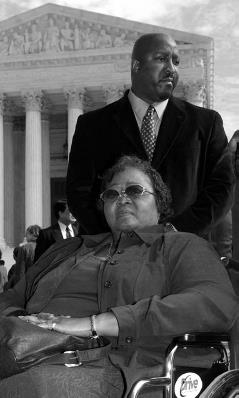The Roberts Court (2005–present)Decisions |
In what decision did the Court explain what statements are “testimonial” subject to a criminal defendant’s Confrontation Clause rights? |
The Roberts Court explained the meaning of “testimonial” statements for constitutional criminal law purposes in the consolidated cases of Davis v. Washington and Hammon v. Indiana (both 2006). These cases gave the Court a chance to explain its 2004 decision in Crawford v. Washington. In that decision, the Court ruled that testimonial statements must satisfy the Sixth Amendment’s Confrontation Clause, giving the defendant the right to cross-examine witnesses. This means that if a person gives an accusatory statement to the police, then the defendant generally has a right to confront the speaker or listener of those statements in Court.
Davis v. Washington and Hammon v. Indiana involved domestic violence cases in which women either made a 911 call to the police or told police in an interview that their male companions had beaten them. In each case, prosecutors brought criminal charges against the men but the women later refused to testify. The prosecutors in each case sought to introduce the statements under the “excited utterance” exception to the hearsay rule. In the Davis case, the police sought to introduce the text of the 911 call and in Hammon, the police sought to introduce the woman’s statement to the police.
The Roberts Court determined by a vote of 8–1 that the 911 call was not testimonial and, thus, could be freely admitted at trial. However, the Court determined that the statement to the police in the Hammon case was testimonial and would violate the defendant’s Confrontation Clause rights. Writing for the Court, Justice Antonin Scalia established the following rule:
Statements are nontestimonial when made in the course of police interrogation under circumstances objectively indicating that the primary purpose of the interrogation is to enable police assistance to meet an ongoing emergency. They are testimonial when the circumstances objectively indicate that there is no such ongoing emergency, and that the primary purpose of the interrogation is to establish or prove past events potentially relevant to later criminal prosecution.
Applying this standard, Scalia reasoned that the 911 call was nontestimonial because it was part of an “ongoing emergency,” while when the woman made the statement to the police in Hammon there was no such emergency.

